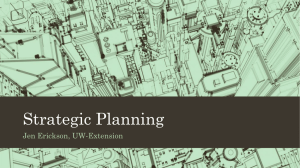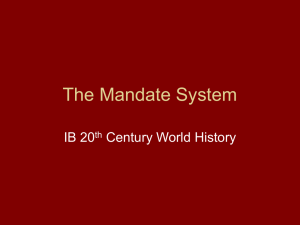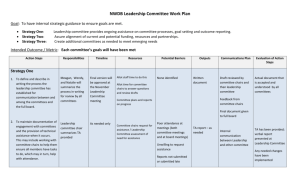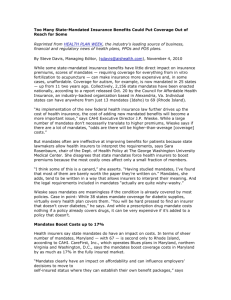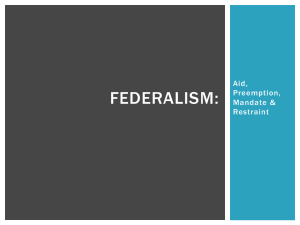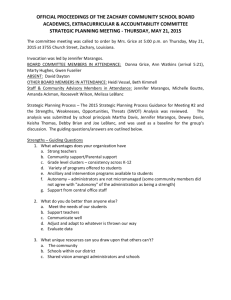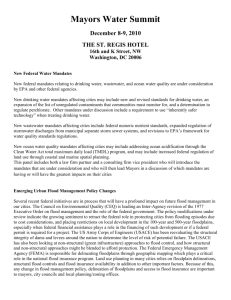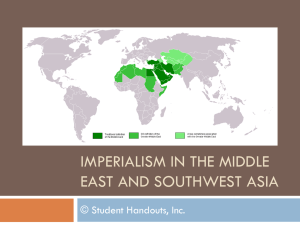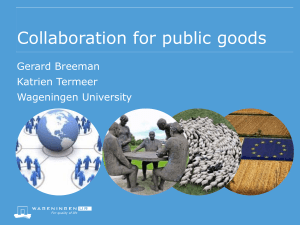CIDRP00558E05
advertisement
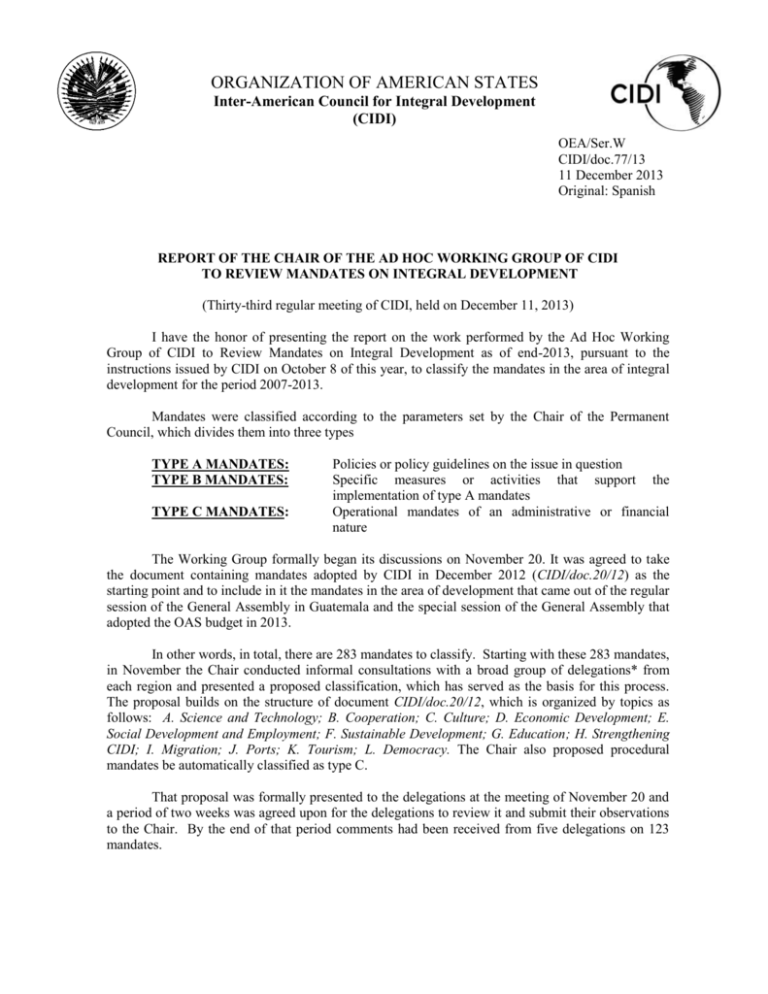
ORGANIZATION OF AMERICAN STATES Inter-American Council for Integral Development (CIDI) OEA/Ser.W CIDI/doc.77/13 11 December 2013 Original: Spanish REPORT OF THE CHAIR OF THE AD HOC WORKING GROUP OF CIDI TO REVIEW MANDATES ON INTEGRAL DEVELOPMENT (Thirty-third regular meeting of CIDI, held on December 11, 2013) I have the honor of presenting the report on the work performed by the Ad Hoc Working Group of CIDI to Review Mandates on Integral Development as of end-2013, pursuant to the instructions issued by CIDI on October 8 of this year, to classify the mandates in the area of integral development for the period 2007-2013. Mandates were classified according to the parameters set by the Chair of the Permanent Council, which divides them into three types TYPE A MANDATES: TYPE B MANDATES: TYPE C MANDATES: Policies or policy guidelines on the issue in question Specific measures or activities that support the implementation of type A mandates Operational mandates of an administrative or financial nature The Working Group formally began its discussions on November 20. It was agreed to take the document containing mandates adopted by CIDI in December 2012 (CIDI/doc.20/12) as the starting point and to include in it the mandates in the area of development that came out of the regular session of the General Assembly in Guatemala and the special session of the General Assembly that adopted the OAS budget in 2013. In other words, in total, there are 283 mandates to classify. Starting with these 283 mandates, in November the Chair conducted informal consultations with a broad group of delegations* from each region and presented a proposed classification, which has served as the basis for this process. The proposal builds on the structure of document CIDI/doc.20/12, which is organized by topics as follows: A. Science and Technology; B. Cooperation; C. Culture; D. Economic Development; E. Social Development and Employment; F. Sustainable Development; G. Education; H. Strengthening CIDI; I. Migration; J. Ports; K. Tourism; L. Democracy. The Chair also proposed procedural mandates be automatically classified as type C. That proposal was formally presented to the delegations at the meeting of November 20 and a period of two weeks was agreed upon for the delegations to review it and submit their observations to the Chair. By the end of that period comments had been received from five delegations on 123 mandates. -2- At the first meeting to review the proposal of the Chair, held on December 6, the room considered 51 of the 123 mandates on which comments were submitted, and identified duplicated or superseded mandates. Of the 51 mandates reviewed at the meeting, 30 coincided with the classification proposed by the Chair, while the classification of the other 21 was amended by common agreement of those present. There are 73 commented-on mandates pending classification, in addition to other observations that may be received from a number of countries that have requested more time to complete their consultations with their capitals. In other words, the work of the Working Group is 75% complete. It is important to point out that the delegations have made it clear throughout the process that the aim of this exercise is simply to classify the mandates and at no time to attempt to prioritize topics or activities, and that the categories (A, B, and C) do not imply a scale in terms of importance. In the classification process the exercise has been hampered by the confusing wording of some mandates. This has led delegations to consider the need to propose that CIDI update the mandate drafting guidelines agreed upon in April earlier this year (CIDI/doc.42/13), in order to take account of the fact that mandates establish general policies, define specific measures and activities to support implementation of those policies, or are operational mandates of an administrative or financial nature. In this connection, I should point out that the concerns that have arisen in the framework of the Working Group's discussions have already been reflected in the Work Plan of the Committee on Partnership for Development Policies. In conclusion, Mr. Chairman, I would like offer my sincere thanks to all the delegations that took part in this classification process. It has been a difficult task since many mandates lend themselves to more than one classification. The Working Group has been very disciplined in following the parameters laid down by the Chair of the Permanent Council and we have attempted to identify the intentions behind each mandate in order to classify them appropriately. Thanks to the constructiveness of the delegations and teamwork, we have made very satisfactory progress in this complicated task. I would especially like to thank the Vice Chair of the Working Group Ms. Ana Juárez, Alternate Representative of Guatemala, who has been of invaluable assistance to the Chair in the multiple informal consultations carried out. I would also like to express my gratitude to Executive Secretary Sherry Tross, Ms. Monica Villegas, and the entire SEDI team for treating this task with the importance that it deserves and for their unfailing willingness and technical support. -3- We hope that at the next meeting, to be held in the second week in January, we can complete the remaining work and submit a consolidated proposed classification to CIDI in time for its next regular meeting. Yadir Salazar Mejia Minister Counselor, Alternate Representative Permanent Mission of Colombia to the OAS yadir.salazar@cancilleria.gov.co Tel: +1 (202) 332-8003/04 | Ext. 33 1609 22nd Street, N.W. Washington, D.C. 20008 Washington D.C., United States www.cancilleria.gov.co CIDRP00558E04
